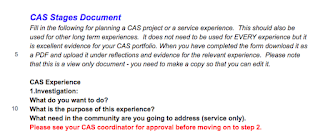To get the gold trophy you need to have:
- evidence for all experiences
- CAS project with the CAS stages started and added in the correct way (see previous post about that)
- reflections for experiences that have been going for most of the term.
Reflections and evidence can be:
- pictures/photos
- recordings
- meeting agendas
- attendance records
- audio recordings
- videos
- and anything else you can think of.
Projects
It is important that you have at least begun planning your project even if you haven't actually started it yet. That means you have written a short description and goals as well as filled in the CAS stages form and uploaded it under 'evidence and reflection.' (See last post about how to that correctly).
If you really cannot come up with a project I have some ideas. The week after the exam week, I will take all the people who do have not yet started a project and they can join one of the ones I have. Here's one suggestion about how to design a service project can really meet a need in the community.
 Convictus is an organisation that helps homeless people. They take in donations in the form of clothes but often what they get is not what they want. Homeless people need items such as: underwear, socks, towels, woollen socks and mittens/gloves, backpacks. You can see the notice from the window here. Just now they also want sleeping bags.
Convictus is an organisation that helps homeless people. They take in donations in the form of clothes but often what they get is not what they want. Homeless people need items such as: underwear, socks, towels, woollen socks and mittens/gloves, backpacks. You can see the notice from the window here. Just now they also want sleeping bags.I also read in an IB newsletter about some primary school children who decided to donate items to homeless people and found out that the most common items that are donated are 'unwanted t-shirts, old dresses and scuffed shoes.' * What they found out was most needed was: clean underwear and socks.
This is a case of really finding out what the need is rather than just collecting a whole lot of items that are not really needed. It is easy for people to throw away unwanted clothing - but actually spending a few crowns to buy some underwear or socks is much more useful.
The primary students in Wisconsin were able to get donations of new, clean socks and underwear that really helped people in need.
If you don't have a project and would like to help in this way, come and see me and I can help you contact the organisation. Or come up with your own idea and find some people to work with! Just try to find a real need.
* Odum, Sophie-Marie, editor. “Thinking Outside the Box.” IB World The Magazine of the International Baccalaureate, Oct. 2017, p. 5.










